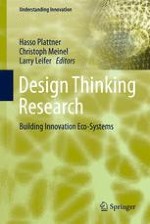2014 | OriginalPaper | Buchkapitel
Acting with Creative Confidence: Developing a Creative Agency Assessment Tool
verfasst von : Adam Royalty, Lindsay Noelle Oishi, Bernard Roth
Erschienen in: Design Thinking Research
Aktivieren Sie unsere intelligente Suche, um passende Fachinhalte oder Patente zu finden.
Wählen Sie Textabschnitte aus um mit Künstlicher Intelligenz passenden Patente zu finden. powered by
Markieren Sie Textabschnitte, um KI-gestützt weitere passende Inhalte zu finden. powered by
